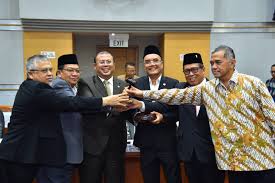Commission VIII of the Indonesian House of Representatives (DPR RI) plays a critical role in formulating policies that address religion, social issues, women, and children. However, the absence of female leadership in this commission reveals a systemic issue in Indonesia’s political framework. Despite its mandate to represent and advocate for gender equality, the commission reflects entrenched structural, cultural, and political barriers that hinder women’s participation in leadership roles.
Keywords : Women, Gender Disparity, Politics
Commission VIII of DPR RI is responsible for addressing some of Indonesia’s most pressing societal issues, including those affecting women and children. Ironically, whilst the commission’s mandate emphasises gender-sensitive issues, its leadership has been consistently dominated by men. This discrepancy raises concerns about the efficacy of the commission in addressing gender-related challenges and points to broader systemic barriers that restrict female leadership in Indonesian politics. To understand this disparity, it is essential to examine the barriers embedded within Indonesia’s political and electoral systems, which continue to marginalise women in leadership roles despite the growing recognition of their importance in addressing gender-sensitive issues.
Structural Barriers
Structural barriers are deeply rooted in Indonesia’s political and electoral systems, which limit the participation and advancement of women in leadership roles.
- First, political parties wield significant influence in determining leadership roles within DPR commissions. Despite the implementation of a 30% gender quota for candidate lists, these quotas are often symbolic rather than substantive. Women are frequently placed in unelectable positions on party lists, resulting in limited female representation within parliament. A 2023 study by the Indonesian Women’s Coalition highlighted that only 14% of top party leadership roles are occupied by women, reflecting a systemic bias that extends to commissions.
- Second, the electoral system itself perpetuates inequalities. Indonesia’s open-list proportional representation system allows voters to select individual candidates, which can disadvantage women due to societal biases. Women candidates often lack the resources and networks necessary to compete effectively, further narrowing the pool of potential female leaders within commissions.
Cultural Barriers
Cultural norms and societal perceptions also play a significant role in excluding women from leadership positions. Indonesian society traditionally views leadership as a male domain, a perception reinforced by conservative interpretations of gender roles. This is particularly relevant in Commission VIII, where religious affairs are a key focus. Conservative religious groups often resist the idea of women in leadership, citing traditional roles for women as caregivers and supporters rather than decision-makers.
Furthermore, gender stereotypes perpetuate the notion that women are less capable of managing leadership roles, especially in areas perceived as requiring strong authority, such as religion and social policy. Women leaders often face scrutiny over their ability to balance professional responsibilities with family obligations, deterring many from pursuing or being considered for leadership positions.
Political Barriers
Political dynamics within Commission VIII and the broader, DPR RI also contributes to the absence of female leadership. Tokenism is a prevalent issue, with women often included in commissions to meet gender quotas but excluded from meaningful decision-making roles. This undermines their influence and reinforces male dominance in leadership positions. Additionally, the lack of mentorship and networking opportunities for women in politics perpetuates their exclusion from leadership roles. Male-dominated networks prioritise their peers for key positions, leaving women without the support or sponsorship necessary to advance. This dynamic is evident in Commission VIII, where leadership selections continue to favour men despite the presence of capable female members.
Impact on Policy-Making
The absence of female leadership in Commission VIII significantly impacts the formulation and implementation of policies aimed at addressing issues such as domestic violence, child welfare, and maternal health. These issues often require a gendered lens to fully grasp their complexities and develop effective, inclusive solutions. Women leaders bring unique perspectives and lived experiences that are vital in crafting policies that resonate with the realities faced by women and children. Without their input, policies risk being overly generic or failing to address the nuanced and deeply personal challenges faced by these groups. For instance, programmes to combat domestic violence may overlook critical elements such as survivor support systems or the socio-cultural barriers that discourage women from seeking help.
This lack of representation not only hinders the quality and effectiveness of policies but also damages the commission’s credibility. Leadership that does not reflect the diversity of the population it serves fosters a perception of disconnect and exclusion. Constituents, particularly women and marginalised groups, may feel that their voices are not adequately represented, leading to scepticism about the commission’s ability to advocate for their needs. This gap can result in lower public trust and engagement, further weakening the commission’s legitimacy and undermining its efforts to implement meaningful change.
The consequences of this disconnect extend beyond perception, they influence the commission’s capacity to enact progressive, equitable policies. Without diverse leadership, biases and blind spots in policy-making are more likely to persist, perpetuating cycles of inequality and inefficacy in addressing gender-specific challenges. The absence of female leadership in Commission VIII DPR RI reflects broader systemic barriers that hinder women’s participation in Indonesian politics. Addressing these barriers is not only a matter of representation but also a prerequisite for equitable and effective policymaking. By fostering an inclusive leadership structure, Commission VIII can better fulfil its mandate to advocate for women, children, and other marginalised groups, setting a precedent for gender equality in Indonesia’s political institutions.








